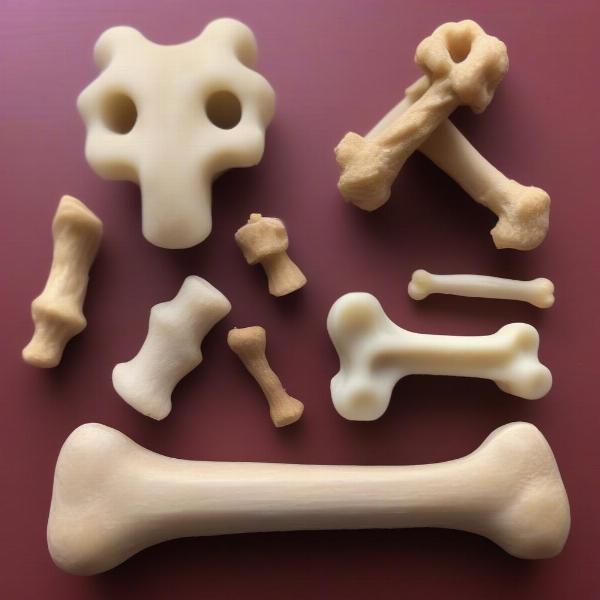Choosing the right chew bones for your small dog can be a daunting task. With so many options available, it’s important to consider your dog’s size, chewing habits, and overall health. This guide will help you navigate the world of dog chews and select the best and safest options for your little companion. We’ll cover everything from the benefits of chewing to potential hazards and specific recommendations for small breeds.
Chewing is a natural and essential activity for dogs, especially small breeds. It helps clean their teeth, massage their gums, and relieve stress and boredom. However, not all chew bones are created equal. Some can be too hard, posing a risk of fractured teeth, while others may splinter and cause digestive issues. Choosing the right chew bone is crucial for your small dog’s dental health and overall well-being.
Why Chewing is Important for Small Dogs
Small dogs are particularly prone to dental problems like plaque and tartar buildup. This can lead to gum disease, tooth loss, and even more serious health issues. Providing appropriate chew bones can significantly reduce these risks. The act of chewing helps scrape away plaque and tartar, keeping their teeth clean and their gums healthy. Additionally, chewing can provide mental stimulation and prevent destructive behaviors that can arise from boredom or anxiety.
Types of Chew Bones for Small Dogs
There are numerous types of chew bones available, each with its own pros and cons. For small dogs, it’s crucial to choose chews that are appropriately sized and durable enough to withstand their chewing habits but not so hard that they pose a risk to their teeth.
Dental Chews
Specifically designed to promote dental health, these chews often have ridges and textures that help clean teeth and freshen breath. They come in various flavors and sizes, making them appealing to even the pickiest eaters.
Bully Sticks
Made from beef muscle, bully sticks are a natural and highly digestible chew option. They are long-lasting and provide a good source of protein. However, they can be quite odoriferous, something to keep in mind if you’re sensitive to smells.
Rawhide
Rawhide chews are popular, but they require careful selection. Look for rawhide that is made in the USA and avoid those that are chemically treated. dogs and raw chicken bones can be dangerous, so always supervise your dog when they are chewing on rawhide.
Natural Chews
Other natural chew options include chicken feet, chicken feet for dogs, and moon bones for dogs. These are readily digestible and provide essential nutrients. However, they may not be as long-lasting as some other options.
Choosing the Right Size and Texture
Size is critical when selecting chew bones for small dogs. A chew that is too large can be difficult for them to manage, while one that is too small can be a choking hazard. Choose chews that are specifically designed for small breeds or cut larger chews into smaller, manageable pieces. dog toys and chews offer a variety of suitable options.
 Chew Bone Size Comparison
Chew Bone Size Comparison
Tips for Safe Chewing
- Supervision: Always supervise your dog when they are chewing on any type of bone.
- Discard Damaged Chews: Throw away any chews that become small enough to be swallowed whole.
- Fresh Water: Ensure your dog has access to fresh water, especially after chewing.
- Variety: Offer a variety of chews to keep your dog interested and prevent boredom.
- Consult Your Veterinarian: If you have any concerns about your dog’s chewing habits or dental health, consult your veterinarian.
Conclusion
Choosing the best chew bones for small dogs involves careful consideration of their size, chewing habits, and overall health. By following the guidelines in this guide, you can ensure your small companion enjoys the benefits of chewing safely and happily. Remember, providing appropriate chew bones is a crucial part of maintaining your dog’s dental health and overall well-being.
FAQ
- What are the best chew bones for aggressive chewers? For aggressive chewers, consider durable nylon chews or extra-tough natural options like antlers.
- Can puppies have chew bones? Yes, puppies can have chew bones, but choose those specifically designed for puppies and supervise them closely.
- Are cooked bones safe for dogs? No, cooked bones are dangerous for dogs as they can splinter and cause internal injuries.
- How often should I give my dog a chew bone? This depends on your dog’s individual needs and chewing habits. Start with a few times a week and adjust as needed.
- What should I do if my dog swallows a piece of chew bone? Contact your veterinarian immediately if your dog swallows a piece of chew bone.
ILM Dog is a leading international pet website dedicated to providing expert advice on all aspects of dog care. From dog ice cube trays to breed selection and health advice, we offer a wealth of resources for dog owners worldwide. Whether you’re a seasoned dog owner or just starting out, ILM Dog is your go-to source for reliable and practical information. Contact us at [email protected] or +44 20-3965-8624 for expert advice and personalized support.